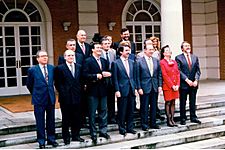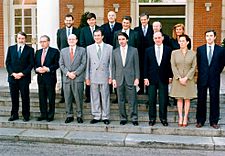First government of José María Aznar facts for kids
Quick facts for kids 1st government of José María Aznar |
|
|---|---|
Government of Spain |
|
| 1996–2000 | |
|
The government in May 1996 (top) and April 1999 (bottom).
|
|
| Date formed | 6 May 1996 |
| Date dissolved | 28 April 2000 |
| People and organisations | |
| Monarch | Juan Carlos I |
| Prime Minister | José María Aznar |
| Deputy Prime Ministers | Francisco Álvarez-Cascos1st, Rodrigo Rato2nd |
| No. of ministers | 15 |
| Total no. of members | 19 |
| Member party | PP |
| Status in legislature | Minority government |
| Opposition party | PSOE |
| Opposition leader | Felipe González (1996–1997) Joaquín Almunia (1997–1998) Josep Borrell (1998–1999) Joaquín Almunia (1999–2000) |
| History | |
| Election(s) | 1996 general election |
| Outgoing election | 2000 general election |
| Legislature term(s) | 6th Cortes Generales |
| Budget(s) | 1997, 1998, 1999, 2000 |
| Predecessor | González IV |
| Successor | Aznar II |
The first government led by José María Aznar was set up on May 6, 1996. This happened after he was chosen as the Prime Minister of Spain by the Congress of Deputies (Spain's main parliament) on May 4. He officially took his oath on May 5. His party, the People's Party (PP), won the most seats in the 1996 Spanish general election.
This government took over from the previous one led by Felipe González. It was the official Government of Spain from May 6, 1996, until April 28, 2000. This means it was in power for about four years. The government included members from the PP and some people who were not part of any political party (called independents). It officially ended on March 13, 2000, after the 2000 Spanish general election. However, it continued to manage things until the next government was ready to take over.
Contents
How the Government Was Formed
After the 1996 election, José María Aznar needed to be approved by the Spanish parliament. This process is called an investiture. To become Prime Minister, he needed more than half of the votes from the 350 members of the Congress of Deputies. This meant he needed at least 176 votes.
On May 4, 1996, the parliament voted. Aznar received enough votes to become Prime Minister.
| Vote to Approve the Prime Minister José María Aznar (PP) |
||
| Vote on → | 4 May 1996 | |
|---|---|---|
| Votes needed → | 176 out of 350 |
|
|
Yes (181 votes)
|
181 / 350
|
|
|
166 / 350
|
||
|
Abstentions (1 vote)
• UV (1)
|
1 / 350
|
|
|
Absentees (2 people)
• HB (2)
|
2 / 350
|
|
| Sources | ||
Who Was in the Government?
The government was made up of the Prime Minister, two Deputy Prime Ministers, and 14 different ministers. These ministers were in charge of different areas, like foreign affairs, justice, defense, and education. The group of all these ministers is called the Council of Ministers.
| ← Aznar I Government → (May 6, 1996 – April 28, 2000) |
||||||
| Role | Name | Party | Started | Left | Ref. | |
|---|---|---|---|---|---|---|
| Prime Minister | José María Aznar | PP | May 5, 1996 | April 27, 2000 | ||
| First Deputy Prime Minister Minister of the Presidency |
Francisco Álvarez-Cascos | PP | May 6, 1996 | April 28, 2000 | ||
| Second Deputy Prime Minister Minister of Economy and Finance |
Rodrigo Rato | PP | May 6, 1996 | April 28, 2000 | ||
| Minister of Foreign Affairs | Abel Matutes | PP | May 6, 1996 | April 28, 2000 | ||
| Minister of Justice | Margarita Mariscal de Gante | Independent | May 6, 1996 | April 28, 2000 | ||
| Minister of Defence | Eduardo Serra Rexach | Independent | May 6, 1996 | April 28, 2000 | ||
| Minister of the Interior | Jaime Mayor Oreja | PP | May 6, 1996 | April 28, 2000 | ||
| Minister of Development | Rafael Arias-Salgado | PP | May 6, 1996 | April 28, 2000 | ||
| Minister of Education and Culture | Esperanza Aguirre | PP | May 6, 1996 | January 19, 1999 | ||
| Minister of Labour and Social Affairs | Javier Arenas | PP | May 6, 1996 | January 19, 1999 | ||
| Minister of Industry and Energy | Josep Piqué | Independent | May 6, 1996 | July 15, 1998 | ||
| Minister of Agriculture, Fisheries and Food | Loyola de Palacio | PP | May 6, 1996 | April 30, 1999 | ||
| Minister of Public Administrations | Mariano Rajoy | PP | May 6, 1996 | January 19, 1999 | ||
| Minister of Health and Consumer Affairs | José Manuel Romay Beccaría | PP | May 6, 1996 | April 28, 2000 | ||
| Minister of Environment | Isabel Tocino | PP | May 6, 1996 | April 28, 2000 | ||
| Spokesperson of the Government | Miguel Ángel Rodríguez | PP | May 8, 1996 | July 10, 1998 | ||
Changes in July 1998 |
||||||
| Role | Name | Party | Started | Left | Ref. | |
| Minister of Industry and Energy Spokesperson of the Government |
Josep Piqué | Indep./PP | July 16, 1998 | April 28, 2000 | ||
Changes in January 1999 |
||||||
| Role | Name | Party | Started | Left | Ref. | |
| Minister of Education and Culture | Mariano Rajoy | PP | January 19, 1999 | April 28, 2000 | ||
| Minister of Labour and Social Affairs | Manuel Pimentel | PP | January 19, 1999 | February 20, 2000 | ||
| Minister of Public Administrations | Ángel Acebes | PP | January 19, 1999 | April 28, 2000 | ||
Changes in April 1999 |
||||||
| Role | Name | Party | Started | Left | Ref. | |
| Minister of Agriculture, Fisheries and Food | Jesús Posada | PP | April 30, 1999 | April 28, 2000 | ||
Changes in February 2000 |
||||||
| Role | Name | Party | Started | Left | Ref. | |
| Minister of Labour and Social Affairs | Juan Carlos Aparicio | PP | February 21, 2000 | April 28, 2000 | ||
Important Changes in the Government
During its time in power, Aznar's first government had a few changes in its ministers. This is called a cabinet reshuffle, which means some ministers leave and new ones join.
- July 1998: Josep Piqué became the new Spokesperson of the Government. This person's job is to speak for the government to the public. He took over after the previous spokesperson, Miguel Ángel Rodríguez, left.
- January 1999: There was a bigger change.
- Manuel Pimentel became the new Minister of Labour and Social Affairs.
- Mariano Rajoy moved from the Public Administrations ministry to become the Minister of Education and Culture.
- Ángel Acebes then took Rajoy's old job as Minister of Public Administrations.
- April 1999: Jesús Posada became the Minister of Agriculture, Fisheries and Food. He replaced Loyola de Palacio, who was chosen to run in the European Parliament election.
- February 2000: Manuel Pimentel resigned as Minister of Labour and Social Affairs. This happened because of some problems involving one of his close helpers. Juan Carlos Aparicio was then appointed to replace him.
Images for kids
-
José María Aznar, Prime Minister
-
Francisco Álvarez-Cascos, First Deputy Prime Minister
-
Rodrigo Rato, Second Deputy Prime Minister
-
Abel Matutes, Minister of Foreign Affairs
-
Jaime Mayor Oreja, Minister of the Interior
-
Rafael Arias-Salgado, Minister of Development
-
Mariano Rajoy, Minister of Education and Culture (from Jan 1999) and Minister of Public Administrations (until Jan 1999)
-
Javier Arenas, Minister of Labour and Social Affairs (until Jan 1999)
-
Manuel Pimentel, Minister of Labour and Social Affairs (Jan 1999 – Feb 2000)
-
Juan Carlos Aparicio, Minister of Labour and Social Affairs (from Feb 2000)
-
Josep Piqué, Minister of Industry and Energy, and Spokesperson of the Government (from July 1998)
-
Loyola de Palacio, Minister of Agriculture, Fisheries and Food (until April 1999)
-
Jesús Posada, Minister of Agriculture, Fisheries and Food (from April 1999)
-
Ángel Acebes, Minister of Public Administrations (from Jan 1999)
-
José Manuel Romay Beccaría, Minister of Health and Consumer Affairs
See also
 In Spanish: Primer Gobierno Aznar para niños
In Spanish: Primer Gobierno Aznar para niños
 | Precious Adams |
 | Lauren Anderson |
 | Janet Collins |























